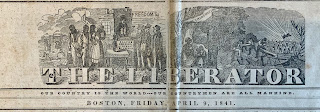"Resolved, That American slavery is a complication of the foulest crimes, such as robbery, adultery, man-stealing and murder and ought therefore to be immediately and unconditionally abolished."
That shouldn't have been very controversial among the student body. There were plenty of ardent abolitionists on campus. But when the convention started, the hall filled with Dartmouth students who began whistling, stamping their feet, clapping and carrying on with "other disgracefully indecorous, (not to say riotous,) conduct." Why? Well, one of the speakers had dissed Dartmouth President Nathan Lord and the students were not going to have any of it. They caused such a commotion that the speakers were disrupted and eventually the convention had to abandon its efforts.
Parker Pillsbury reported on the incident for The Liberator. He ended with a jab at Dartmouth's favorite son:
A few such scenes as that I have attempted to describe, would give Dartmouth College a reputation as lesting as it would be infamous. Daniel Webster did her no injustice when he stood on the Mason and Dixon's line and pledged the North to the interests of the unrighteous despotism of the South. Let him and the College wear the laurels they have won. Their acts are recorded, and posterity will do them justice.
Nine years later, Webster would further infuriate the abolitionist movement with his impassioned plea to the Senate to pass the Fugitive Slave Act. Things changed on campus--in 1855, the student body tried to chase the same president from his office for his pro-slavery views, and in 1862, he was forced to resign by the Board of Trustees (if you want to learn more about about it check out this podcast episode).
To see Parker Pillsbury's account in The Liberator, ask for DC Hist. LD1438.3 .P557 1841.


.jpeg)